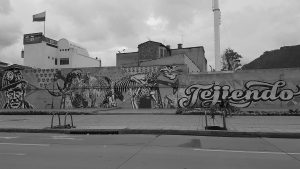Kent International Law expert Dr Luis Eslava speaks of a transformational process happening in Colombia in an interview for online news magazine AlterNet ahead of the country’s national plebiscite on Sunday.
The plebiscite is being held to decide if the people approve the government’s peace deal with the rebel leadership of the Revolutionary Armed Forces of Colombia (FARC).
Dr Eslava, who is also an International Professor at Universidad Externado de Colombia, speaks of a ‘process of great transformation’ taking place in Colombia, affirming that the country is ‘full of progressive energy’ ready to be unleashed if the country confirms the peace agreements. Dr Eslava is interviewed for the article, ‘A 50-Year Civil War That Killed Over 250,000 and Devastated Colombia Has Finally Reached a Peace Agreement’, by Vijay Prashad, George and Martha Kellner Chair in South Asian History and Professor of International Studies at Trinity College in Hartford, Connecticut. Professor Prashad is the author of the seminal books The Darker Nations: A People’s History of the Third World (New York Press, 2007) and, The Poorer Nations: A Possible History of The Global South (Verso, 2012).
Writing in a post on the same topic for the Critical Legal Thinking blog, Dr Eslava says the plebiscite on 2 October is: ‘a day when another Colombia and another world become possible. On 2 October 2016, a country of 48 million people will confront their own history.’ He goes on to describe the plebiscite as: ‘an incredibly important moment for current Colombia. This is a moment when Colombians can demonstrate to themselves that they are something different from which they have become after sixty years of civil war.’
Dr Eslava, a Senior Lecturer in International Law, teaches undergraduate and postgraduate students at Kent Law School. He is also a Senior Fellow at Melbourne Law School, and Faculty at the Harvard Law School’s Institute for Global Law and Policy. He teaches and writes in the areas of International Law, International Legal Theory and History, Anthropology of International Law, Public Law, Law and Development, and Urban Law and Politics. His research focuses on the relationship between international and domestic legal orders, and the effects of this relationship both on our jurisprudential understanding of these areas of law, and on the constitution of everyday life in today’s global order.
His book Local Space, Global Life: The Everyday Operation of International Law and Development was awarded the Hart Socio-Legal Book Prize and the Prize for Early Career Academic earlier this year.


